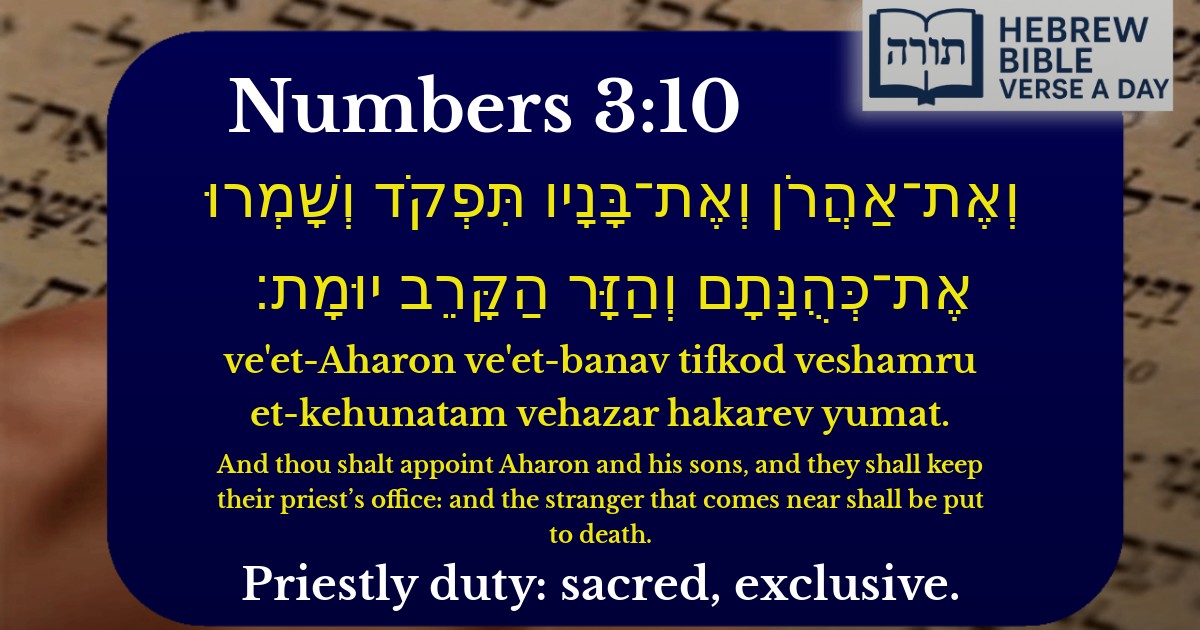Join Our Newsletter To Be Informed When New Videos Are Posted
Join the thousands of fellow Studends who rely on our videos to learn how to read the bible in Hebrew for free!
Hebrew Text
וְאֶת־אַהֲרֹן וְאֶת־בָּנָיו תִּפְקֹד וְשָׁמְרוּ אֶת־כְּהֻנָּתָם וְהַזָּר הַקָּרֵב יוּמָת׃
English Translation
And thou shalt appoint Aharon and his sons, and they shall keep their priest’s office: and the stranger that comes near shall be put to death.
Transliteration
Ve'et-Aharon ve'et-banav tifkod veshamru et-kehunatam vehazar hakarev yumat.
Hebrew Leining Text
וְאֶת־אַהֲרֹ֤ן וְאֶת־בָּנָיו֙ תִּפְקֹ֔ד וְשָׁמְר֖וּ אֶת־כְּהֻנָּתָ֑ם וְהַזָּ֥ר הַקָּרֵ֖ב יוּמָֽת׃ <span class="mam-spi-pe">{פ}</span><br>
וְאֶת־אַהֲרֹ֤ן וְאֶת־בָּנָיו֙ תִּפְקֹ֔ד וְשָׁמְר֖וּ אֶת־כְּהֻנָּתָ֑ם וְהַזָּ֥ר הַקָּרֵ֖ב יוּמָֽת׃ {פ}
🎵 Listen to leining
Parasha Commentary
📚 Talmud Citations
This verse is quoted in the Talmud.
📖 Sanhedrin 83b
The verse is cited in a discussion about the prohibition of non-priests performing priestly duties and the severe consequences for doing so.
📖 Zevachim 17b
The verse is referenced in the context of laws pertaining to the sanctity of the priesthood and the exclusive rights of Aaron and his descendants to perform priestly services.


Appointment of Aharon and His Sons
The verse commands the appointment of Aharon and his sons to the priesthood, emphasizing their exclusive role in the service of the Mishkan (Tabernacle). Rashi (Bamidbar 3:10) explains that this appointment was not merely a one-time act but an ongoing responsibility—they were to "keep their priest’s office," meaning they must vigilantly maintain the sanctity of their service and guard against any unauthorized interference.
The Prohibition Against Strangers
The phrase "the stranger that comes near shall be put to death" refers to anyone not from the lineage of Aharon who presumes to perform the priestly duties. The Rambam (Hilchot Klei HaMikdash 5:15) elaborates that this prohibition applies even to a Levi or a Yisrael who attempts to serve in the Mishkan or Beit HaMikdash. The severity of the punishment—death—highlights the sanctity of the Kehuna (priesthood) and the necessity of maintaining its divinely ordained structure.
Sources in Talmud and Midrash
Philosophical and Ethical Implications
The Kli Yakar (Bamidbar 3:10) notes that this commandment underscores the principle of seder (order) in divine service. Just as the universe operates with precise laws, so too must the service of Hashem follow the structure He ordained. The exclusion of "strangers" is not a rejection of their worth but a reinforcement of the unique role of the Kohanim in facilitating the connection between Klal Yisrael and Hashem.